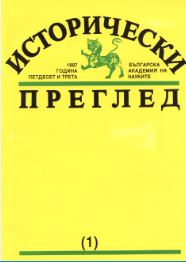Американската просветно-благотворителна мисия на Балканите и в Близкия изток между двете световни войни
The American Education and Charity Mission in the Balkans and the Near East Between the Two World Wars
Author(s): Alexander VelichkovSubject(s): History, Cultural history, Political history, Recent History (1900 till today), Interwar Period (1920 - 1939)
Published by: Институт за исторически изследвания - Българска академия на науките
Keywords: Balkan countries; Near East countries; Carnegie Foundation; Rockefeller Foundation; Protestantism
Summary/Abstract: The American education and charity mission in the Balkan and the Near East between the two world wars was a continuation of the missionary penetration in these areas in the early 19th c. which aimed at integrating the local Christian, Jewish and Muslim population into Protestantism. Which the realization of this task proved beyond one’s strength, the American Board in Boston changed its tactics and “saturated” the educational programme in its religious schools with secular disciplines. This ensured it with the lasting sympathy of the young people and the intelligentsia and opened the road for a wide introduction of the American methods in the national educational institutes. After the First World War the activity of the American colleges in Bulgaria, Greece, Turkey and Syria was supplemented by the big philanthropic organizations – the Near East, Carnegie and Rockefeller Foundations, each of which implemented its own programme of assisting the rural and urban population in the spheres of preventive medicine, physical culture and sports, sanitation, irrigation and land improvement projects, postgraduate qualification of young specialists, etc. From the early 1930s in almost all Balkan countries, Turkey, Syria, Iran, Palestine, Cyprus and Egypt were built practical agricultural schools, anti-epidemiological and health consultative stations, summer playgrounds for children and other similar facilities, sponsored and managed by the respective centres in the USA. It was only on the eve of the Second World War that the deepening crisis in international relations and the ever more frequent warnings of the State Department for speedier evacuation from Europe convinced the American education and charity organizations of the need for discontinuing ahead of schedule the financial and methodological aid abroad. Their contribution to the cultural, scientific and technical progress of the Balkan and Near East states in the period 1919–1939 cannot, however, be overlooked.
Journal: Исторически преглед
- Issue Year: 1997
- Issue No: 1
- Page Range: 13-49
- Page Count: 37
- Language: Bulgarian
- Content File-PDF

